- Home
- Carol Bruneau
A bird on every tree Page 2
A bird on every tree Read online
Page 2
Marion Lester to you, was how I’d introduced myself. The woman who answered the door having no clue who or what I might be. Finally letting me in, she wept to hear of Willard. So it’s good news, not bad? He’s well? My boy is well! Not a moment’s regard for the daughter-in-law who’d sailed so far, then crossed the ice. Grudgingly, she put soup on the table, told me to sit. Starving, I had little appetite for her greasy broth. Who knew a flat in Belfast stuffed with thirteen people, my parents, brothers, and sisters, could be more than matched by this place of promises? There, at least, would have been hugs and a fireside bed. But Willard’s mother provided a curtained-off cot upstairs, herself and three grown men snoring nearby. The water in the wash basin froze so I took my hairbrush to it—the silver-handled one my husband bought as a wedding gift to match the mirror he said mimicked the shape of my face.
But he’s already got a girl, you know, here in the Cove.
In the Cove, in the Arm, appendages of the bigger, broader harbour and the sea stretching clear to Europe—what is she, a mermaid? I said. Staying on, I determined to write to him, describing my complaint. And the ice melted, eventually, so that it was no longer possible to cross the water on foot, but only by open boat. Which was how I made excursions to town—and got around, I don’t mind saying—when I wasn’t watching ships passing in the channel beyond, from the porch of his family’s home with its mud cellar and outhouse, and a small, stony brook running past, emptying into the cove. At night I listened to it, the only music to drown out the sounds of his parents and brothers sleeping. As the nature of my complaint grew so might their affections, I thought; they would have to.
Willard will make a fine dad, another reason for the war to end and for him to come home, said my mother-in-law, Margaret. She happily put me to work. Since you’re here you’d best make yourself useful. Impossible to go about unnoticed, watched like some foreigner come to pinch the cutlery. If there’d been any worth pinching.
He was shorter than I remembered, and thinner, when his ship finally came in; his shock of dark hair dulled and greasy, eyes the same; and he startled at the sound of pennies dropping into the pantry tin. His mother’s cache, splurged on butter and milk because her boy had returned from the war. At night he turned his eyes away, clinging to me like a piece of cork. If only I could’ve drifted off. It was like treading over shell ice while waiting for a thaw, for something, anything to shift and take me away. That fall I gave birth to a girl he named after his mother—in thanks for her looking after me.
Of course Margaret’s your daughter, I said; do the arithmetic, you’ve got the fingers.
I didn’t raise you. But you’re all right, Margaret One said to me, just the once. Like squeezing juice from a plum pit. A small version of her granny was Margaret Two, who, in her child’s way, thrived. There was talk of Willard going to the United States, to New York, Chicago, even Hollywood, California, to make a living at drawing cartoons. Right, and I’ve got a cellar full of whale blubber I’ll sell you cheap, his mother said; and for once she and I were agreed.
I doubt he’d have taken Margaret, our daughter, with him.
At night, crammed between them in the cot, I’d dream, a strange dream in which I was a gull perched on the bluff, granted a view not just of the cove but the rubble on its bottom. The skeletons of boats, broken bottles—no treasure, mind—even a piano, with barnacled keys. The remains of a horse and a good-sized cart, and dogs, the dreadful frozen carcasses of dogs. Luckily I’d wake before seeing human ones, the scattered bodies of any who’d gone through the ice, eyes eaten away by creatures creeping over the seabed, well beyond the rocks. I would wake, and so much for sleeping in: Margaret One brimming with plans for me, scrubbing, cooking, and, any spare moments, keeping Margaret Two out of her hair. Willard too:
Every kid should know how to swim. Whyn’t you teach her?
Teach her yourself. You’re her da.
But I found myself one stifling July day leading the child up the rocky path to the pond in the woods. Like a bowl of boiled tea dark as your arse, rushes all around it, and wild laurel and huckleberry bushes, and bullfrogs snapping their jaws or limbs, however they made their noise. Sure I’d been a swimmer in Belfast; dare me to dive in anywhere and out-swim anyone. But it was salt water I liked, not brown murk. And didn’t Margaret Two toddle off a rock and down, down—just the top of her reddish curls floating up like a jellyfish before disappearing altogether.
Don’t just frigging stand there! What are ya, froze? Are ya that stunned a mother?
Wasn’t it Flossie Brunt, the gal Willard had been sweet on, who jumped in, clothes and all, and saved her—my little girl’s face fish-white as I fussed and fretted over her, and slowly, slowly got her breathing again. I confess, it was like some dreadful thing had wrapped itself round my ankles and chained me there.
Some mother you are. If I hadn’t of been there, what, you’d of let her drown? Scared of getting your feet wet?
You little bitch, said Margaret One when it got around.
It could’ve happened to anyone, Willard said.
The dreams worsened. I’d see Margaret Two in her little smocked dress, a bow in her hair, lying on the bottom like a doll. Except her face was her grandmother’s, and I’d see myself resting beside her, peepers wide open, deader than dead. No Willard, though. No longer nervous as a cat, in the dream he was enjoying the high life in the USA, sitting under a palm tree at a drawing table, drinking whisky on ice and sketching his heart out, Margaret One waiting on him hand and foot.
To be fair, the old woman wasn’t all bad. The only way to get over your fears is facing ’em, she told Willard, staring him down when the clang of a pot lid would send him under the table. A grown man! Giving me the evil eye, she’d go back to spoiling Margaret Two, stuffing her with molasses kisses. Bribes, if you ask me, as I tried not to think they were two peas in a pod, a pebble—Willard—between them.
By the time the girl was seven, I swear she had the old doll’s scowl.
How’d a looker like you spawn her? that hateful Flossie Brunt had the gall to say, once.
Yeah? I’ll show you who you’re talking at.
Watched your own kid near-drownded. You’ve showed me all right.
Who knows what her beef was? Common knowledge by now what a basket case poor Willard was.
Jealous, are you?
Not that it mattered; by then I’d been rescued, more or less. But when word of the upcoming race ran in the paper, I had an idea what she was up to, Flossie the ‘best swimmer this end of the cove.’ Skinny legs on her, wouldn’t last five minutes out there, spending all summer performing her strokes in Tea Lake; I happened to know for a fact, perfecting mine offshore. Sure, she’d chicken out even before the gun went off.
As it happened, she didn’t. But as I hacked and sliced up to the two-and-a-half-mile mark, I had no care or thought of Flossie Brunt or anybody, except the man I knew in town. A benefactor, you could say. The one who’d found me a position in the office of his friend, an ophthalmologist’s, as a matter of fact. A dogged word, that, whose rhythm matched my strokes: one two three four five, breathe. Even though I could no longer see or hear a bleeding thing—neither cheering onlookers nor splashes and bobs ahead—all I knew was I mustn’t look back. Somewhere behind me, sure, Flossie Brunt would be mussel-blue, the air shivering with her curses. Flossie not the only one colder than a brass monkey’s balls in February.
The man in my mind, the one who’d entered me in the competition, had a warm, soft heart, a wife, and two sweet daughters to prove it. All I had to do, in exchange for a splendid little flat—an entire floor to myself, leaded glass in the entry—was entertain him now and then. So I’d already won, when you look at it that way; the race another thing altogether—icing on the cake, sure, if I pulled it off. If I lived to pull it off. Not that things were ever simple or straightforward. Not after what I’d been through.
Not after the effort required. A solid string of burn lifting my head up, then lowering it, up then down, and my arms too: I was a puppet to the waves. Besides that string, I could barely feel anything now.
Well, Mar, you always did find your way, a voice very like my mother’s seemed to call out. If you’ve got hopes for yourself other than cleaning some rich lady’s house and wiping her brats’ arses, you’d best have a plan. One’s as good as another. Choose me, Willard had said; my benefactor too, my face doing all the talking necessary. Snooze and you lose; you’re dead a long time. That’s what old Margaret, my mother-in-law, would say; not that I’d needed her permission to walk away from there. And just as I took a briny lungful, a commotion stirred: some poor gangly thing—a cadaver?—being lifted up and away; or maybe I was dreaming it? Maybe, since I could no longer feel where my body ended and my tarry soul began, it was me? Drowned dead in the final heat, dragged up and away, a loser.
Except in my ears the glug became a hiss, like every flat in every corner of the city had its taps turned on, running—a hiss that whistled and shuddered and pushed deeper than water or air ever could. A hiss that was sharper and deeper and louder than any fish or engines or oars could make, louder than the blood thumping my ears; and through it bloomed faces, gunwales, hands, hands reaching and waving—and my knees struck rock, pebbles, the squish of mud, the rippling glimmer of upside-down trees breaking around me.
Trees, grass, and the white-and-green of the boathouse, these I saw, and the flare of sunlight not flashbulbs. I saw myself all alone, in those seconds before arms boosted me up and onto shore. Not another swimmer to be seen, and in my confusion—the blinding sunlight painting everything with blackness—I knew I’d come in last. If hell has a tint to it, sure it must be green like the lapping water as I was lifted—or maybe it was purgatory. I confess it was Willard’s face that bobbed in my head as they plunked me on a platform, at the foot of the terraced lawn. Will you not even think about coming back to us? he was saying in my head, as they bundled towels round me and raised my dead stick-arms skyward. But they were screaming out my name—not the old voices but real ones.
I only knew they were real when they pricked me pinning the ribbon to my chest. And a fellow with a notebook stuck his face into mine: So, Miss Marion Lester. Came up outta nowhere, now you’re the champ. How does it feel?
The life coming back into me. “Words can’t begin—,” I said.
Doves
It is a long way from Lagos to Greystone, and God’s will that brings me here. His hand steers the car into the frozen, bumpy parking lot. Helping Hand, says the sign. Put your hand in the hand: music stirs in my head, clapping too. The sound of clapping hands, marching feet; of people on the move, dancing in the Spirit. But on this most bitter of days, Mission Monday, there is no time for singing. There is work to be done.
The woman inside greets me, smiles as if seeing the Holy Mother. I swing my bag up onto the counter, mittens collected by the diocese.
“Any large ones?” She mouths the words wide as if that will aid my understanding. My face is so cold I do not speak, emptying out the contents. A mother with a small boy comes up and rummages.
“You givin’ these away? Or do we gotta buy ’em?” The mother looks past me, past my hands, which are starting to thaw. She has a blue rucksack tucked under her arm. The boy clutches an orange plastic gun. There are rules regarding such donations, rules too often broken. His eyes are milky brown, like a river. There is mud—chocolate—around his mouth. He grabs a mitten; his mother slaps his hand.
“Don’t touch, I said. How many times I gotta tell you?” The mother’s voice is a nail splitting wood—she jerks the boy’s arm—“Wha’d I say?” and the boy drops the mitts in the puddle at our feet.
My veil sweeps my cheek as I retrieve them. Wiping them off, I hold them out. The boy slaps them away, and the mother swats his head. I retrieve them again and pass them to her. But her eyes move past me and fix on the woman behind the counter, who blinks and says, “Take them.”
We see so many mothers like this, Sister Marcetta and I: pale white girls pushing strollers, with their thin white boyfriends wearing ball caps. They choose clothes that don’t look warm enough and they smoke, looking at us in a way that makes me want to cover my face. The look is cold and shameless. God forgive me for throwing stones. It is the children in the strollers whom Jesus gathers to Himself; for whom Marcetta and I most gratefully labour.
“The peace of the Lord be with you,” I say softly. The boy aims his weapon, lets it fall to his side.
“Put that down, I toldja. I’m not buyin’ nothing.”
Clothing is free to those who cannot pay, though the sale of donations funds our work. I pray for patience and to not grow weary, and that the love of Jesus will spill from my heart into the hearts of others.
The woman behind the counter says, “Sister, if you wouldn’t mind—”
There is sorting to be done, and I am in charge of it. Pots and pans, children’s books, baby clothes, and women’s dresses such as Jezebel, wife of Ahab, might wear. Everything comes in large green garbage bags stuffed to overflowing. The donations are so plentiful they could be things collected after a famine perhaps, or a massacre—but they are clean, of course, if threadbare. Today there is a girl to help me, a volunteer named Tina.
“Tina,” I say. “What is that short for?”
“Christina,” she says, not looking up. The thing most noticeable in this mission is how the helpers and the helped look past you, as if talking to a bystander. As if they see your guardian angel, and it is she, not you, who is speaking.
“What should I do with this?” Tina asks. It looks like a man’s belt, studded dangerously with chrome. “My boyfriend wants one just like it,” she hints, and smiles, and tucks it inside her coat. She isn’t dressed for the cold either, the skin above her slacks so very white, white as milk watered down to nourish a multitude.
“Sister Berthe?” The girl’s voice is flat, and I think of the doulas whom Sister Marcetta enlists to attend mothers giving birth to babies without fathers. I can’t help but look at this girl’s stomach; the way she has no stomach at all but doesn’t look hungry. No one here looks hungry for anything but guidance. The light of Christ, who came into the world so that we might see.
“Yes, my child,” I say, a pair of trousers folded over my arm and many pairs more to sort and hang.
“Shit—oh, shoot. Someone needs help.”
The woman from behind the counter appears. Her grin confuses me; her eyes are hard and grey as the roadway. Before I can step from the sorting area into the display room full of clothing, broken toys, mugs, plates, ashtrays, and plastic flowers, there’s a shout, a cry that sends needles up my spine. Buses and cars spit, shooting past just outside.
“What is it, my child?”
The man before me has wild hair, as though he has stood for days on a mountain in the freezing wind. His eyes spin and dart. He’s wearing a torn quilted coat, gold in colour, gold as threshed wheat. His hands are bare and chapped and he wrings them—to warm them, perhaps. But then he waves them, his hands a burning bush of activity, a firestorm, and he curtsies the way people curtsy for Queen Elizabeth, a trip-step then up again, and pushes himself past my outstretched arms. Briefly I feel his breath on my face and catch his smell; it is the smell of spiritual hunger: too much wine at the wedding feast.
Tina and the woman from the counter shy behind a rack of coats—worn, thick woollen coats that make me think of sheep, of sacrifices made to God before our washing in the Blood of the Lamb. The woman, whose name escapes me, clears her throat and gasps. As if spotting a body swinging past in a current. Parting the sea of rags, I peer through. The man with wild eyes is urinating on the furniture, a plaid sofa that would have gone free to whomever asked. Seek and ye shall find; ask and it shall be given.
“Get out. Get out now,” the woman orde
rs. “You are not welcome in this place.” Her voice is stony as the soil of our mission, and as cold as the dawn when, on Fridays, I rise to prepare the small white wafers for Holy Communion. Just in case, as Sister Marcetta says.
The man zips his pants, wipes his nose. His gaze is cast downwards. There is a roll of Lifesaver candies beside the cash box, and I peel one away and offer it. He puts his tongue out as if to receive the Host. It calms him and, thank the Lord, the community of saints, and all the archangels, he turns, shrugging his shoulders, and leaves.
When all the garbage bags have been emptied and their contents sorted, I take the volunteers’ hands and we pray in a small circle. Their hands are pale as fish, and I think of the miracle of the loaves and fishes, the feeding of the five thousand. Such a numbering of the hungry challenges me: I see multitudes of the living coursing down dusty streets. I see rivers running red.
“See ya next week,” Tina shouts, following me to the car, carrying the large white mittens I have almost forgotten. Sister Marcetta was kind enough to provide them, along with a gift of lock de-icer. It’s a very long way from Lagos, Satan’s voice cajoles as I scrape frost from the car.
“God be with you,” I call out. “Bless you, dear. Bless you.”
At the convent, Sister Marcetta mashes potatoes for the hungry who will partake of the Hot Meal held near the mall. I think of the man in the quilted coat, and of mothers and dark-skinned babies, and pray silently for new ways to serve the Lord. Marcetta mixes in an egg, margarine, and bluish milk for extra nutrition, and sets aside a dishful for us. Putting on boots she calls mukluks, she carries the pot to her car. Just the tip of the cross in our front yard shows above the snow; it’s as plain as a grave marker when there aren’t the means for something permanent. The blue security sign is buried, too. I vaguely recall the presence of grass.

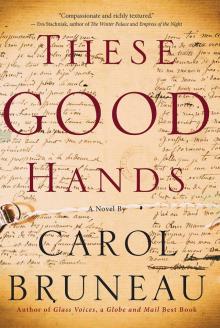 These Good Hands
These Good Hands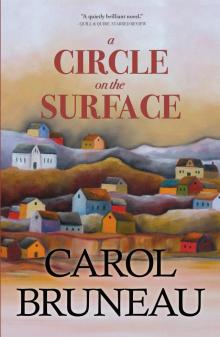 A Circle on the Surface
A Circle on the Surface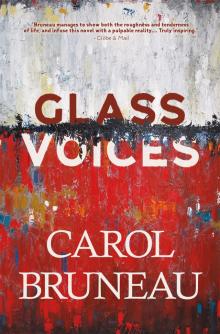 Glass Voices
Glass Voices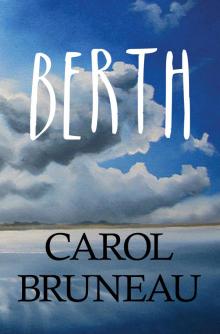 Berth
Berth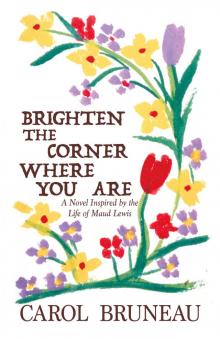 Brighten the Corner Where You Are
Brighten the Corner Where You Are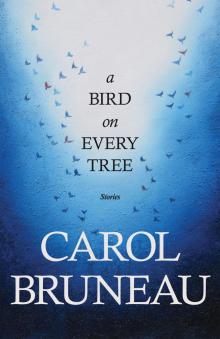 A bird on every tree
A bird on every tree